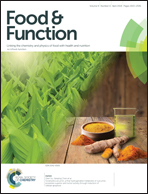n-3 polyunsaturated fatty acids prevent d-galactose-induced cognitive deficits in prediabetic rats†
Abstract
Nutritional deficit of n-3 polyunsaturated fatty acids (PUFAs) is closely related to cognitive impairment and depression in later life. Cognitive impairment and depression lead to comorbidities, such as metabolic syndrome, in elderly people. The aim of this study is to evaluate the effects of dietary n-3 PUFAs on cognition and depressive-like behavior in an accelerated senescence rat model with prediabetic status. Rats were cotreated with D-gal and sucrose solution for 7 months and then fed fish-oil- or flaxseed-oil-rich diets for 3 months. Cognitive impairment analysis and depressive-like behavioral testing were conducted using the Morris water maze (MWM) test and forced swimming test (FST), respectively. The MWM test results revealed that the D-gal + sucrose + flaxseed oil (DSFS) group had a significantly shorter mean latency time in the short-term spatial memory trial on day 2 than did the D-gal + sucrose + fish oil (DSFO) group. The FST results demonstrated that the DSFO group exhibited a significantly shorter immobility time and longer climbing time than did the control group. Western blot analysis of the receptor for advanced glycation end-product (RAGE) level identified a significant difference in the DSFO group compared with the control group. Significantly lower n-6/n-3 PUFA ratios were observed in the frontal cortices of the DSFO and DSFS groups. In conclusion, fish and flaxseed oils exerted a protective effect on cognitive impairment and decreased the incidence of depressive-like behavior in D-gal- and sucrose-fed prediabetic aging rats. n-3 PUFA-rich oil diets, particularly the fish oil diet, reduced the plasma levels of nonesterified fatty acids, tumor necrosis factor-α, and brain dopamine and RAGE expression but not glycemic status, resulting in an improvement in the time of escape latency and the time spent in the target quadrant in the MWM test.



 Please wait while we load your content...
Please wait while we load your content...